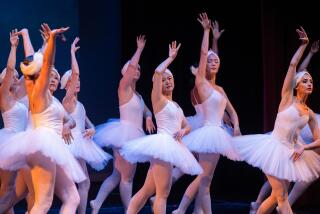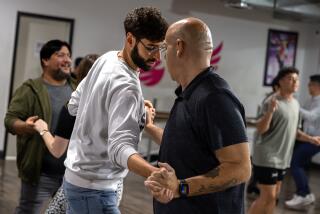British Black Dancers to Make U.S. Debut
- Share via
LONDON — The gibe about London being the largest Third-World country in Europe is no joke to choreographer Beverly Glean.
Glean, 30, is the director of Irie! Dance Company, an eight-member, all-black modern group based in the minority-dominated South East London borough of Deptford. The company makes its American debut tonight at the Los Angeles Theatre Center as part of the UK/LA ’88 Festival.
Founded in 1986, Irie! (pronounced eye-ree ) takes its name from a small African drum, and the company is meant to be a celebration of black choreography and black people in Britain. The accessible and even populist repertory is an eclectic mix of musics and styles, an interweaving panorama of influences that owes more to such American models as Alvin Ailey and Garth Fagan than it does to any of the national folk companies of the Third World.
“Irie! isn’t an ethnic dance company,” Glean says. “When people say that black dancers should go back to their roots, I want to scream, ‘What roots?!’
“Most of the black dancers in Britain were born in Britain, and a lot of them don’t want to do African dance, have no interest in African dance, don’t even like African dance. This whole notion of roots is a very shortsighted one. Irie! wants to be seen as a contemporary dance company. The color of our skin isn’t the central issue.”
On the other hand, Glean says black dancers in London are automatically considered second-class citizens.
“We go through the same training programs in this country as white dancers. But, at the end of it, we have nowhere to go. The established companies are predominantly white and don’t seem to be interested in black dancers.
“Until such time as there is a black British company on a par with major organizations like London Contemporary Dance Theatre (which has an Indian and two black men among its 18 dancers), it is important that Irie! remain an all-black company. But it is also important that we don’t try to turn Irie! into just a political movement.
“What we’re really trying to do is simple: We want to heighten the profile of black dance in England.”
After graduating from the Laban Centre, one of England’s two major schools for modern dance, Glean held a variety of part-time free-lance dance jobs in schools, prisons and day care centers.
In the early ‘80s, she was hired by the Albany Empire, a community center smack in the midst of one of the most mammoth public housing projects in London, to set up an annual dance festival that would bring all types of dance into the community, usually for single performances.
“The festivals were great,” Glean says. “We were able to commission new pieces from choreographers, but as soon as the festival was finished the dances would be gone forever. That’s what gave me the idea of forming a company of our own.”
In 1985 Glean did some quick calculations, discovered that 1986 was going to be designated as “Caribbean Focus Year” in Britain, and decided the time was right to launch a black troupe. Soon, the company started to explore pop music as a creative source.
“We wanted to have something of our own,” Glean says, “something that would relate to this community.
“We want to show our audience that your culture is something that can be developed, brought into the theater and used as a viable art form.”
The Irie! format quickly took shape as a blend of all dance styles, a fusion of influences.
“We don’t want to throw out our European training,” Glean says.
Last season’s major production was a holiday show called “Mass Carib.” The next big project will be a full-length ballet. It’s going to be an urban reworking of the Orpheus myth and will have an original score by black composer Mike Rose.
“We’re calling it a ballet on purpose,” Glean says, “because there are so many stereotypes around that word. When you say ballet , people automatically think of women on point doing a sort of dancing suitable only for the middle and upper classes. But we’ve decided ballet is a word for everybody, so we’re very deliberately going to use it.”
Like all of Glean’s notions, she’s determined to make the nomenclature work: “It’s wonderful going out there and saying, ‘We’re black and we’re here and we’re staying.’ ”
More to Read
The biggest entertainment stories
Get our big stories about Hollywood, film, television, music, arts, culture and more right in your inbox as soon as they publish.
You may occasionally receive promotional content from the Los Angeles Times.










